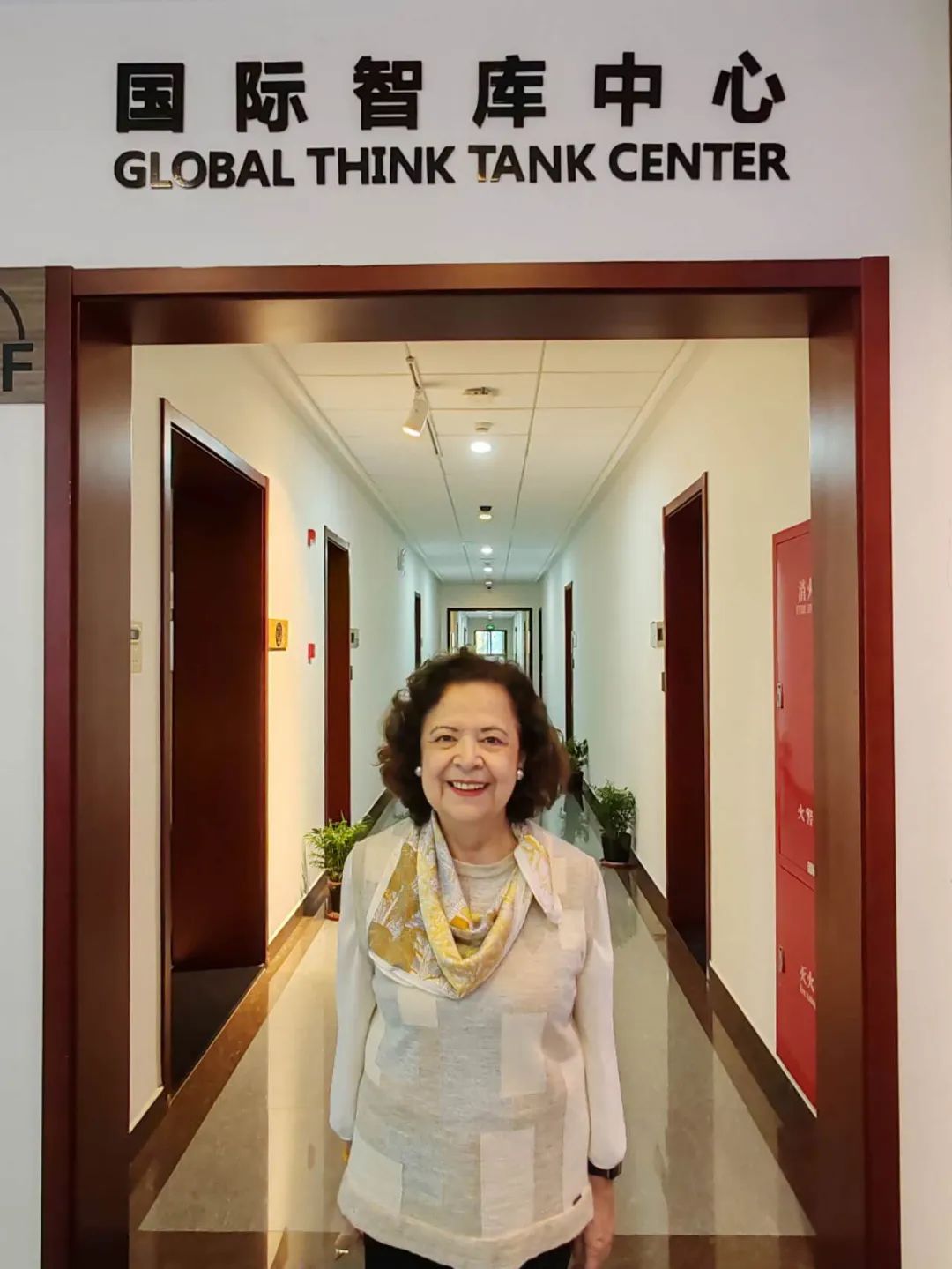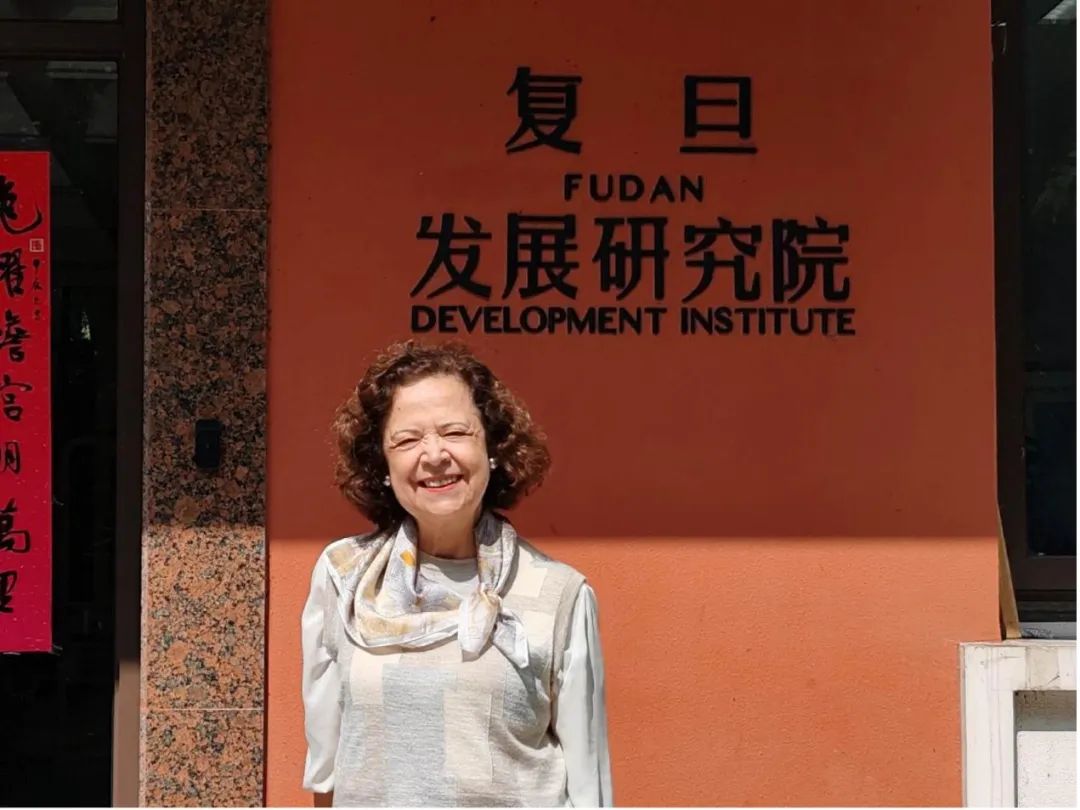作者:WANG Jingyang 发布时间:2024-10-10 10:50:49 来源:Fudan University+收藏本文
“You can study China with data and literature. But you should see China with your own eyes,” said Dr. Rosario SANTA GADEA, visiting scholar at the Fudan Development Institute (FDDI) and former director of the Center for China and Asia-Pacific Studies at the University of the Pacific in Lima, Peru (CECHAP).

As a Peruvian scholar and practitioner of international economic relations, Dr. Santa Gadea’s early academic and professional career focused on the European Union-Latin America (EU-LA) relations, the Latin American regional integration, especially South American physical integration, and policy-oriented issues on economic development and globalization. After three decades of work and research in these areas, she shifted her focus to studying countries across the Pacific, with a particular emphasis on the economic relations between China and Peru.
Journey with China and Fudan

“The path of China-Latin American relations has been quite different from that of EU-LA, as we can see for example, in the case of Peru, with regards to the trade composition with each one of these partners” Dr. Santa Gadea noted. According to her, China has experienced “enormous economic growth”, transforming from a low-income to an upper middle-income economy over the past four decades. “This makes China a significant case study for Peru and other Latin American countries. China’s successful experience in industrialization and manufacturing exports is especially relevant to Peru today.”
Dr. Santa Gadea was appointed director of CECHAP in 2015. “Back then, we had no contact with Chinese institutions or scholars,” she said. Since then, she has visited China nine times, establishing personal and institutional connections with prestigious scholars, universities and think tanks, including Fudan University.
In 2017, she had a productive first meeting in Shanghai with Professor ZHANG Jun, dean of the School of Economics (SOE) and director of China Center for Economic Studies, and Professor KOU Zonglai, vice dean of SOE at Fudan University, which led to CECHAP’s collaboration with SOE and the FDDI. On that occasion, she also met Professor ZHANG Yi, executive vice dean of FDDI. Since then, mutual academic visits and joint activities have become increasingly frequent and fruitful.
Dr. Santa Gadea visited again professors Zhang and Kou at Fudan University in her annual academic missions to China of 2018 and 2019 which were occasions for discussing possible joint activities. In 2018, ZHANG Jun and KOU Zonglai were invited to visit Lima, where they shared their findings on China’s transformation over the past three decades in the annual international symposium organized by CECHAP that year. Professor Zhang was also invited to be part of the Advisory Consultative Council of the Center.
In 2023, Professor WAN Guanghua, director of the Institute of World Economy of Fudan University, was invited to Lima as keynote speaker at the annual international symposium of the Center. In 2023-2024, Dr. SHI Shou, from FDDI, was visiting scholar during six months at the Center in Lima. This autumn, Dr. Santa Gadea came to Fudan as a visiting scholar at FDDI through the Fudan-Latin America University Consortium (FLAUC) Fellow Program.
During her term as director of CECHAP (2015-2023), Dr. Santa Gadea and her collaborators have organized several conferences in Peru about China, exchanging ideas on its development policies, economic transformation and openness, industrialization, Belt and Road Initiative (BRI) challenges and opportunities of China-Peru and China-Latin America economic relations, among others. Concerning research, “one of the most important topics with regards to economic development is the middle-income trap, which is a common challenge faced by both China and Peru, among many other developing countries,” she noted. Her work in this topic culminated in the publication of the book Finding a Way to Avoid the Middle-Income Trap: The Cases of China and Peru, in 2021 (English version) and 2023 (Spanish version) coedited by Dr. Santa Gadea and Dr. ZHANG Yuyan, director of the Institute of World Economics and Politics (IWEP) of the Chinese Academy of Social Sciences (CASS).
Study China in depth through FLAUC Fellow Program

As a platform established to promote exchange and cooperation between Fudan and prestigious universities in Latin America, FLAUC contributes to building long-term collaboration and strengthening ties between China and Latin America.
One important initiative is the FLAUC Fellow Program, which recommends scholars to visit and explore potential research cooperation opportunities among member universities. FDDI provides applicants with substantial subsidies, workspace, library resources, and opportunities for site visits.
“My research this time focuses on China’s industrialization,” Dr. Santa Gadea explained. According to her, Peru can learn many valuable lessons from China’s economic transformation. “I am particularly interested in the role that special economic zones (SEZs) play in China’s industrial modernization and development.”
During her stay at FDDI, she is having the opportunity to engage with various Chinese scholars to deepen her research. Direct interactions with experts in this field provides her with fresh perspectives on the topic. “I truly appreciate FDDI’s support in making all this possible,” she said.
Moreover, in September, she visited Suzhou Industrial Park to further study in practice how this important industrial platform functions and stimulates economic growth and development. Before coming to Fudan, she requested the Embassy of China in Peru to help her to arrange this visit that was organized by the Foreign Affairs Office of Suzhou Municipal Government.
More to expect on future cooperation
“Fudan has a busy and exciting campus,” Dr. Santa Gadea said, reflecting on her first encounter with the university. Cooperation between Fudan and universities in Latin America has deepened and become more frequent, extending from co-hosting academic conferences to sending visiting scholars among member institutions in order to advance research.
“We’ve been focusing on exchanges among institutions at the professor and researcher level,” Dr. Santa Gadea explained. However, she adds that “cooperation and exchanges should also be open to individual researchers or experts that do not necessarily have an institutional affiliation but show a long-term carrier in the field of China and Asia-Pacific in order to benefit from their valuable expertise and knowledge”.
Another front of collaboration concerns undergraduate students. This summer, a few of them, from the University of the Pacific, also participated in the Fudan University International Summer Session (FISS).
According to Dr. Santa Gadea, much has been accomplished so far, but even more can be expected in the future.